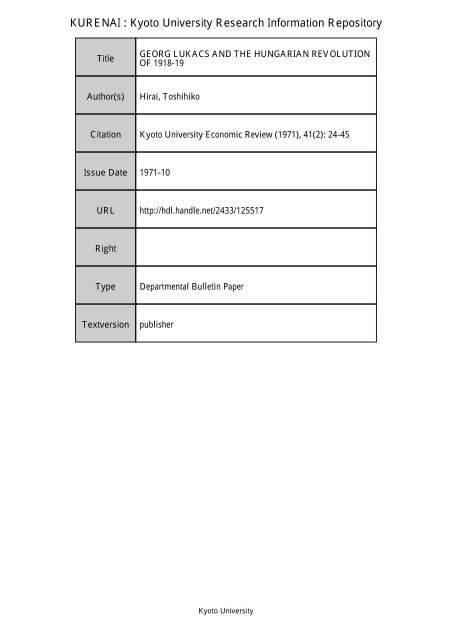GEORG LUKACS AND THE HUNGARIAN REVOLUTION OF 1918-19
GEORG LUKACS AND THE HUNGARIAN REVOLUTION OF 1918-19
GEORG LUKACS AND THE HUNGARIAN REVOLUTION OF 1918-19
Create successful ePaper yourself
Turn your PDF publications into a flip-book with our unique Google optimized e-Paper software.
<strong>GEORG</strong> <strong>LUKACS</strong> <strong>AND</strong> <strong>THE</strong> <strong>HUNGARIAN</strong><br />
<strong>REVOLUTION</strong> <strong>OF</strong> <strong><strong>19</strong>18</strong>-<strong>19</strong><br />
by Toshihiko HIRAI*<br />
I Three Anti-Monarchy Movements in Hungary<br />
Partly because Hungary in the early days of this century when the thoughts of<br />
young Lukacs were formed in the country, was lagging behind in the social, political<br />
and economic development in comparison with west European countries and<br />
partly because of different social patterns from the said advanced countries, in<br />
the anti-monarchical movements in Hungary we can find a few unique features of<br />
its own.<br />
According to the "Development of Hungarian Industrial Class" by Gyula<br />
Rezler, it is reported that the proportional munbers of industrial workers in 1880's<br />
were less than I % of the total population of Hungary.I) Since that time her<br />
manufacturing industry began to make a certain extent of progress during the<br />
transitional period to this century and incidentally the class-composition began to<br />
undergo some changes according to such circumstance. Yet Hungary in the<br />
early days of this century as a whole was an agricultural country as she used to.<br />
Because her agriculture which was a principal industry, was given such a great<br />
blow by the import of very cheap wheat in an enormous quantity to the middle<br />
and east European countries from America during the latter half of the last century<br />
that the gentry could no longer cope with the fluctuating and unstable market<br />
economy and people had to surrender themselves to the nobles who were great landowners<br />
and to the monarchical power of government based on such foundation.')<br />
According to the official memorandum about Hungarian landownerships in <strong><strong>19</strong>18</strong>,<br />
2/3 of all agricultural lands was owned by only 1/7 of all landowners and the<br />
remaining 6/7 of them owned no more than 1/3 of all agricultural lands. Particularly<br />
the living standard of "those agricultural workers who did not own their<br />
lands" was in extremely destitiute and miserable conditions. When Victor Zitta<br />
made a survey of the living standard of Hungarian population from an aspect of<br />
illiteracy and tuberculosis, he pointed out that the rate of Hungarian illiteracy<br />
showed as high as 33% of her total population in comparison with 0.4% in Germany<br />
and 0.2 in Denmark and further reported that the number of tubercular patients<br />
* Professor of Economics, Kyoto University<br />
1) Gyula Rezler, A Magyar Nagypari Munkassag Kialakuldsa (Development of the Hungarian<br />
Industrial Working Class), 2nd ed., Budapest, <strong>19</strong>45. p. 98.<br />
2) Victor Zitta, Georg Lukacs' Marxism: Alienation, Dialectics, Revolution - A Study in Utopia<br />
and Ideology, Hague, <strong>19</strong>64. pp. 29-30.
<strong>GEORG</strong> LUKAcs <strong>AND</strong> <strong>THE</strong> <strong>HUNGARIAN</strong> <strong>REVOLUTION</strong> 25<br />
was as many as 1/6 of the total population. 3 )<br />
On the other hand as to her political system, Hungary had been under ruling<br />
of the Habsburg Monarchy since 1867. Although an representative system was<br />
only formerlly in existence, the right to vote was limited only to a very small<br />
number of the privileged class and the freedom to hold any meeting or to<br />
form any organisation, had never been secured.') The report which a Hungarian<br />
representative of Socialist Democratic Party addressed to the International Congress<br />
in Stuttgart, August 18-24, <strong>19</strong>07, included the following passages. "There<br />
exists no law providing for the freedom of meeting in Hungary. The meetings<br />
are often controled by official order from the government authorities. Our<br />
party has never been free to form even one political club or any other organisation<br />
owing to the government prohibitive regulations. But the workers, who were<br />
equipped with the class consciousness, have managed themselves to form a "free association"<br />
to function in secret. This particular free association is the fundamental<br />
element of the organisation of our Party."') Furthermore, the authorities concerned<br />
were always keeping their watchful eyes against any anti-government movement<br />
and they often exercised their supreme power, intending to plot oppressive<br />
measures repeatedly upon the masses. For an example, Zitta made the following<br />
explanation. "In those days in <strong>19</strong>03 when Lukacs was playing an active part in<br />
the Nyugat circles, General Fejervary exercised his ruling over the country by using<br />
his mighty power after dissolving the Parliament. There was no prospect whatsoever<br />
to settle any political problem in Hungary and it became possible for the<br />
government to mobilize human power and natural resources without difficulty as<br />
results of the World War of <strong>19</strong>14."')<br />
Then, was there no chance for any anti-monarchy movement to take place<br />
under such dark social, political and economical conditions? Now, the present<br />
writer shall proceed to describe the background history and characteristics of<br />
general situations in Hungary by presenting them in the following three different<br />
trends of movements, taking reference to the painstaking work entitled, "Bela<br />
Kun and the Hungarian Soviet Republic - The Origin and Role of the Communist<br />
Party of Hungary in the Revolutions ofI918-<strong>19</strong>/<strong>19</strong>67)" written by RudolfL. Tokes.<br />
(a) Hungarian Socialist Democratic Party<br />
It was in 1860's that the buds of Hungarian socialist movements began to<br />
grow up for the first time. The origin of such movements was characterized with<br />
the fact that socialist idea was introduced from abroad by the hands of the Hun-<br />
3) Oszkar Jaszi, Ungarns SUlme, Intro. by E. Bernstein. pp. 1-20.<br />
4) Victor Zitta, ibid" p. 30.<br />
5) "Report of the Hungarian Social Democratic Party to the International (Socialist) Congress"<br />
to be held in Stuttgart, Aug. 18-24, 1097 in Erenyi, Selected Documents, Vol. 3. pp. 552-553.<br />
6) Victor Zitta, ibid., p. 30.
<strong>GEORG</strong> LUKAcs <strong>AND</strong> <strong>THE</strong> <strong>HUNGARIAN</strong> <strong>REVOLUTION</strong> 27<br />
greatest revolutionary potentiality in Hungary then was a great number of agricultural<br />
workers, it was impossible for the leaders of the Party to give any guidance<br />
about the agricultural problems. The agricultural workers who were suffering<br />
from the low wages and heavy labor and who were always disclosed under oppression<br />
of the authoritative power of local police, carried on frequent largescaled<br />
strikes from 1894 to <strong>19</strong>04 and held a demand to the committee of the<br />
party at Budapest to reinforce the solidarity between the urban workers and rural<br />
proletariat. However, the government authorities exercised particularly strict legal<br />
controls over any labor movement staked in localities other than cities and the<br />
Social Democratic Party was rather reluctant to be concerned with the farmers'<br />
struggles. Therefore the radical socialists under a leadership of Istvan Varkonyi,<br />
being dissatisfied with such situation, formed the "Independent Socialist Party" in<br />
1897 and another group with Vilmos Meziifi as a president leader further established<br />
the "Hungarian Reconstructed Socialist Democratic Party" in <strong>19</strong>04.")<br />
Now, at this point I shall offer a suggestion beforehand that the above-mentioned<br />
organisational and ideological character of the Hungarian Social Democratic<br />
Party became an underlying cause of the frustration of the Hungarian revolution,<br />
with which Lukacs had to be confronted.<br />
(b) Hungarian Anarcho-syndicalism<br />
Because the tactics of the Hungarian Social Democratic Party that used to be<br />
dependent upon the trade union became more and more inflexible and it became<br />
impossible for the leaders of this party to set up a proper policy of their struggle<br />
at a most serious stage, subsequent to the opposition by the group of farmers mentioned<br />
before, a syndicalist group with Ervin Szab6 as its leader was given<br />
birth within the party in <strong>19</strong>04-5. This group, being different from the said leftist<br />
radicals, was composed mostly of intelligentsia. Among them, for example, Bela<br />
Szant6 and Gyula Alpari were journalists and Jene Laszl6 was a lawyer. In addition<br />
Lajos Tarczai, Vela Vag6 and Laszl6 Ludasjoined this group. It is not clearly<br />
known whether all of these members of this group were anarchosyndicalists or<br />
not, in the strict sense of the words, but they were the component members of the<br />
so-called Szab6 group. They say that the Hungarian Social Democratic Party<br />
was strongly influenced by the German and Austrian Social Democratic Parties,<br />
while it can be said that the Hungarian anarchosyndicalists similarly had a great<br />
deal of French influences.<br />
The anarchosyndicalism achieved its gradual progress by going through the<br />
process, through which the French anarchists participated in the labor union<br />
movements in 1890's and concentrated themselves into Confederation Generale<br />
du Trovail of <strong>19</strong>02.'2) According to Woodcock, "the specific features of anarcho-<br />
11) These two parties which broke off from the Hungarian Social Democratic Party formed the<br />
Association of Agrarian Laborer in later days. Ttikes, ibid., p. 6.
28<br />
T. HIRAI<br />
syndicalism lay in that the diverse elments in the past were made adaptable to the<br />
environment of industrial society at the closing period of <strong>19</strong>th century, that the<br />
labor union was made to become a center of their class struggle and that it created a<br />
theory to regard the labor union as a nuclear of a new society. The two specific<br />
features-that they placed emphasis not upon a commune but upon the labor union<br />
as a basic unit of a society and that they placed more stress upon industrial activities<br />
rather than upon plot or violent behaviors - are two conspicuous points which<br />
distinguish the anarchosyndicalism form the anarcho-communists or the collectivists."")<br />
Evin Szabo (1877-<strong><strong>19</strong>18</strong>), who was interested in reading books written by<br />
Marx, Nietzsche, Proudhon and Kropotkin while studying history and philosophy<br />
in Wien in the days of 1899-<strong>19</strong>03, had much in common with this anarcho-syndicalism<br />
in idea and thereupon intended to revive the stagnated Hungarian socialist<br />
movements.<br />
Especially Szabo raised objection against the bureaucratic ruling of the labor<br />
union staff members over the poorer laborers at the Hungarian Social Democratic<br />
Party Congres. of <strong>19</strong>05 and advocated the significance of a socialistic revolution<br />
through the spontaneity and the solidarity of all workers. "Will it be possible<br />
for any political party, of which means of struggle has turned into such state of<br />
mannerism that, when a leader issues an order to march on, his men simply follow<br />
the order by 'marching on' blindly and obediently, to propagandize or lecture<br />
a lofty ideal of socialism? Those who are in need of training for socialism are<br />
not soldiers but traitors or other spomaneous strugglers. I t should never be<br />
forgotten that socialism must bring forth a society of free men. "14) As long as<br />
Szabo opposed against the "timid parliamentalism" of the leaders of the party and<br />
laid stress on the significance of spontaneous revolutionary struggles by the lower<br />
working class it cann't be concluded that he added an idea of Hungarian<br />
originality to syndicalism. Rather, as pointed out by Tab's, " in Hungary the<br />
conditions were sufficiently ripe for proletariat to maintain and contend their<br />
selfconfidence and homogeneity with France" thought the Hungarian syndicats.<br />
There is something of direct introduction of French syndicalism in the way of<br />
thinking of Ervin Szabo. Consequently such idea could not take root in the<br />
Hungarian labor movements and it gave a considerable influence rather to the<br />
group of leftist' intelligentsia. Speaking of what Lukacs was concerned, he was<br />
a member of Budapest Socialist Student Group which was organised by Szabo,<br />
and Szabo gave marked influences to the Galileo circle which became afterward<br />
a Hungarian leftists' Student Organisation. IS)<br />
12) Tokes, ibid., pp. 9-16.<br />
13) George Woodcock, "Anarchism - A History of Libertarian Ideas and Movements", <strong>19</strong>62<br />
14) Ervin Szabo (Erno Szontagh), "Hogyan M6doslitsuk a Partzerpvezeti Szabalyzatot?" (How<br />
to modify the Party Statutes?) in Erenyi, Selected Documents ............ , Vo1. 3. pp. 263-264.
30<br />
T. HIRAI<br />
demand for the universal suffrage and the land reformation for the purpose to<br />
reform the unreasonable political administration and economic system of Hungarian<br />
empire in those days and made it his ultimate aim to realise a rational<br />
political administration based on reasonable social sciences. In contrast with<br />
it, Szellemkek established the Free School of Spiritual Sciences and took a<br />
revolutionary cultural ism for his ultimate aim from a standpoint of the spiritual<br />
science.<br />
Be the matter as it may, the anti-monarchy movement by the intellignetsia<br />
group opened its curtain in the way of radical oppositions against the out-of-date<br />
academism of the Budapest University in <strong>19</strong>00. The leaders of this group were<br />
Gyula Pikler, then professor of law and philosophy of the Budapest University and<br />
around this leader were Ozskar J aszi and Mihaly Polanyi as his supporters.<br />
These people held the following credo of the youth against the suffocating dark<br />
atmosphere of the University. "It became increasingly evident that research in<br />
history and social sciences lost its integrity and was forced to operate under the<br />
aegis of the feudalistic goverment We lost faith in the church and religion<br />
as guidelines or possible sources of support. A corollary of this view was the<br />
belief that favorable changes could be expected only through the emancipation<br />
of the people, thus paving the road for a better, fuller, and more honest life.<br />
Therefore, we looked with genuine sympathy on the agrarian and industrial type<br />
of socialist movements. "<strong>19</strong>)<br />
Concurrently with this university struggle, on 1st January <strong>19</strong>00, Oszkar Jaszi<br />
who was also a bearer of the university struggle, began to publish the the monthly<br />
magazine, "The Twentieth Century" and one year later the editors and contributors<br />
of this magazine established the "Society for Social Sciences". The former advocated<br />
a "new spiritual and moral synthesis" as their aim and the latter intended<br />
to provide a place to hold open discussion on the varied subjects such as social,<br />
political and economic problems. A great many anti-monarchical journalists,<br />
philosophers, sociologists, historians, etc. gathered together at the center of this<br />
magazine and society and made it a rule to create heated discussions on the<br />
popular and current subjects such as the characteristics of, Fabian socialism,<br />
syndicalism, anarchism, Austrian-Marxism, etc. or the way how they could be<br />
applied to Hungarian society. In the course of a short period immediatedly<br />
after the first edition of this magzaine, the number of its subscribers - they were<br />
also the members of this society - counted as many as several thousands and constituted<br />
a very strong political power.<br />
However, this group of "Twentieth Century" began to take the course of a<br />
gradual disintegration before long owing to their middle-class. characteristics-<br />
<strong>19</strong>) Tokes, ibid., pp. 16-17.
<strong>GEORG</strong> LUKAcS <strong>AND</strong> <strong>THE</strong> <strong>HUNGARIAN</strong> <strong>REVOLUTION</strong> 31<br />
we can often see it in the leftist cultural movements of this kind. And then<br />
most of the members of this society had something common in that they were<br />
anti-monarchical in general, but as far as their thoughts maintained with faith<br />
were concerned, their opinions were so diversified as to satnd for Marx, Bernstein,<br />
Spencer, Comte, Nietzsche, Schpengler, etc. When this society was obliged to turn<br />
toward the leftist idea, and once some problems of socialism had to be taken up<br />
in a more definite shape, those who belonged to the moderate group with Christian<br />
members as its center, withdrew themselves from this society and people<br />
formed a saloon of a reformation group. As soon as the said moderate group was<br />
cleared in this way, this society made a rapid approach to proletariat and facilitated<br />
their solidality with them. As its result "the Free School of Social Sciences"<br />
was inaugurated in the fall of <strong>19</strong>06 and the major group of this school i.e. J aszi<br />
group devoted themselves to realise socialism by way of educating the working<br />
class. J aszi mead the following description of the intelligentsia proletariat,<br />
making evaluation of them as advanced guards for the working class. "We,<br />
the intelligentsia, must change a half-conscious view of life and the world of the<br />
masses into a perfect conception of the world and must engage ourselves to overturn<br />
the existing society by using weapons of morality, science and art.'''O) Furthermore,<br />
this group was maintaining such a standpoint much closer to anarchosynidcalism<br />
that their movements were pushed forward under the solgan to confront<br />
against "doctrine, authority and concentration."<br />
Yet, on the other hand this J aszi group firmly continued to be bourgeois intelligentsia<br />
in all events, without converting themselves to take the proletariat<br />
standpoint, and always endeavored to keep themselves within the frame of<br />
privileged intelligentsia. As its result the Socialist Democratic Party as well as<br />
the working class had antipathly against such an intelligentsia group.") It was<br />
impossible for intelligentsia group with their own standpoint fixed in their mind<br />
to try to transplant a revolutionary thought in the mind of proletariat from the<br />
outside. Indeed, Jaszi constantly maintained an antagonistic attitude against<br />
the World War I and instituted the "Radical Party" in <strong>19</strong>14, but it is pointed<br />
out by Kettler that this Radical Party was by no means radical but was merely<br />
a group of reformers with the nature of opposing party. In short, their fundamental<br />
standpoint was to try to facilitate the movements to modernize Hungary<br />
basing on the west European rationalism and they could make themselves to<br />
provide a support for the political administration acquired through Karolyis bourgeoi's<br />
democratic revolution in <strong><strong>19</strong>18</strong>, but they could never venture to plunge into<br />
a proletarian revolution.<br />
20) Tokes, ibid., p. <strong>19</strong>.<br />
2 J) Kettler, ibid., Japanese Trans!. p. 224.
32 T. HIRAI<br />
II Lukacs and Cultural Revolutionary Movement<br />
Another intelligentsia movement came about on a horizon entirely different<br />
from Jaszi's "Association of Social Sicences" or rather on a standpoint of<br />
"Spiritual Science" in opposition to the said horizon during the period from the<br />
World War I to the Hungarian revolution. Upon returning to Budapest from<br />
Heiderberg, Lukacs felt European cultural crisis in the course of the World War<br />
and organised a researching group with a definite intention to overcome such<br />
difficulties. This was the so-called revolutionary culturalism as pointed out by<br />
Kettler. It was nothing other than "an attempt to devote energies to relieve<br />
the human soul by confirming the dignity of human mind, through cultural renovation"<br />
confronting against the stereotyped European civilisation in these days,<br />
instead of merely trying to raise the level of undeveloped situations in Hungary to<br />
the level of modern rationalism of western European countries.''' The names of<br />
those who participated in the Lukacs group were Bela Balazs, Anna Lesnay,<br />
Bela Fogarasi, Karl Manheim and Arnold Hauser.<br />
The character of activities of this group is described in the "Annals of Dialogue<br />
with Anna Lesnay" in the following way by Kettler. "A meetig for general<br />
talks was held on every Sunday regularly at the house of Bela Balazs who was a<br />
writer and a friend of Lukacs during the period <strong>19</strong>15-18 .......•.. This Sunday<br />
meeting was arranged bv Lukacs in most cases and chaired by him. He usually<br />
presented some subject matters to begin with and all of those present carried on<br />
thoroughgoing and careful discussions on the themes thus presented. The most<br />
typical topics of the talks taken up at this meeting were mainly problems concerned<br />
with morality and literature: in particular the ideas of Dostoevsky and<br />
German mysticism held by Eckhart, etc. were the central points of argument. If<br />
viewed from a political tendency, this group might just well be described to be,<br />
roughly speaking, more like "pro-leftists", yet it would seem to have been much<br />
closer to actual realities, if, how non-political these people were without single<br />
exception, was emphasiged. This group had, indeed, something more similar to a<br />
religious meeting rather than a political meeting. This meeting was filled with<br />
something of ceremonial air as if religious, and those present were all obliged to<br />
speak nothing but perfect truth whatever the matter was to be talked about.'''''<br />
This quoted passage is speaking of the atomosphere of the group in their inauguration<br />
days and the thoughts of Lukacs in those days fairly well. The reason is<br />
because it is assumable that the character of this group was far more non-political<br />
than the predisposition of the "Society of Social Sciences" mentioned before and<br />
that this group was, so to speak, a privileged intelligentsia circle.<br />
Then, what trend of the thoughts had Lukacs in his mind in those days<br />
22) Kettler, ibid., Japanese Trans!. p. 245.<br />
23) Kettler ibid., Japanese Trans!. p. 235.
<strong>GEORG</strong> LUKAcs <strong>AND</strong> <strong>THE</strong> <strong>HUNGARIAN</strong> <strong>REVOLUTION</strong> 33<br />
during the World War I? As already mentioned before, when the leftist intelligentsia<br />
movements began to be actively engaged in Hungary in the early days of<br />
the beginning of this century, Lukacs also ventured upon an attempt, when <strong>19</strong><br />
years old in <strong>19</strong>04, to procede with the anti-monarchy movement by orgainisng<br />
"Thalia Theatre Movement" in Budapest in concerted efforts with Saneor Hevesi<br />
and Laslo Banoczi, but no sooner than their plays were opened to the labor class,")<br />
their movement was crushed by the authoritative power of Hungarian Monarchy<br />
and he was fully awakened with what Hungarian status quo was then. Who<br />
deeply impressed his soul at a starting point of his thought, was a heroic poet<br />
of the Hungarian revolution, Endre Ady. The latest study of Meszaros corroborates<br />
that the dialectics of Lukacs in his youth originated from his cognition of<br />
Hungarian status quo prevailing in those days and his attempt to overcome such<br />
situations.<br />
Ady composed series of poems representing Hungarian spiritlessness and stagnation<br />
in those days, and placed emphasis on responsibility to overcome such<br />
desperate situations. This behavior was based on his profound idea of eschatology<br />
and his principle of the prophetic messianism, but it awakend the consciousness<br />
of crisis in the soul of Lukacs in his youth in a dramatic form of either salvation<br />
or total disaster and his mind was lighted up with stimulation.25) Such resistance<br />
directed against then existing society might assumably have made him approach<br />
toward the political radicalism. At the same ·time such sentiment of his was not<br />
only a specific ideology peculiar to Hungary but also indicating common critical<br />
problems of European cultures in the 20th centruy. According to Meszraos,<br />
"Those who rebelled against the latter had to aim - in ideological terms - at<br />
the transcendence of all the existing forms of impotence-enhancing partial opposition."")<br />
Neverthelesss, on the other hand the essential quality of this resistance was<br />
"the concerns of universality". This resistance brought about several outstanding<br />
culminations of the twentieth century's European cultures such as Ady, Lukacs,<br />
Bartok, Kodaly, Attila Jozseph, etc. Speaking of Lukacs who became a Marxian,<br />
he had always a firm belief that "a religious power peculiar to the primitive Christianty<br />
which could satisfy the soul" should be a universal principle, and this way<br />
of thinking had to be confronted with the standpoint which sought for the principles<br />
of socialism. Hence, if conversely viewed, wouldn't it be assumable that the<br />
tragedy of Lukacs, and incidentally the tragedy of the Hungarian Revolution<br />
were caused from the fact that the said universal principle had to be cut off<br />
from objective development? And we can conclude that because he was by far<br />
too much concerned with such universality at this early days, "speciality" above all<br />
24) G. H. R. Parkinson, "Introduction" in Georg Lukacs, p. 2 Japanese Transl. p. 2-3.<br />
25) Ady. A magyar tragedia nagy enekese (Great Poet of the Hungarian Tragedy) <strong>19</strong>39. p. 28 of the<br />
volume Az Irastud6k Felelsosege (The Intellectuals' Responsibility), Moscow, <strong>19</strong>44.<br />
26) Meszaros. Ibid., p. 44. Japanese Trans!. p. 68.
34<br />
T. HIRAI<br />
had to be pushed forward in his later days.<br />
Such historical consciousness of Lukacs was further deepened by the World<br />
War I, which was straightforwardly expressed in his writing entitled "Theory of<br />
Novel" in <strong>19</strong>14-15. Lukacs made recollection of it in the following way. "From<br />
the winter of <strong>19</strong>14 to <strong>19</strong>15 I kept opposing against the war, always making objection<br />
against the meaninglessness and inhumanity of war and subjectively<br />
making my passionate protest. My feeling as a whole was utterly pessimistic as<br />
was desperate. I criticised the existing capitalistic status as "the days of perfect<br />
sins" by using the words of Fichte. In other words my subjective intent was to<br />
march forward to make a protest". 27) This war which was raging not only in<br />
Hungary but also extensively throughout the whole Europe, was nothing other<br />
than a symbol of "the days of the perfect sins" and Lukacs pursued this as "the<br />
tragedy of European cultures in 20th century".<br />
An ideal image of Lukacs in his youth was the Greece in its ancient days<br />
similarly as in the cases of classical thinkers such as Rousseau, Hegel or Marx.2S)<br />
It was a harmonized world where human soul and things, or ego and the world are<br />
not separated - a world of totality. Lukacs made a description of such image of<br />
an ideal world, as it were, a conception of a complete circle in the following way.<br />
"Be it a road along which we can keep going or along which we must keep going,<br />
the days when the stars in the sky could be the map of that road and could shed their<br />
light on that road, ought to be happy. All kinds of things would be something new<br />
for those days, and yet each and everything would have something of intimacy.<br />
Everything would be adventuresome, and yet it could be assets. This world would<br />
spread far out extensively and yet the world would seem to be as if our own home,<br />
because the fires kindled in one soul would be identical with the stars in their substantial<br />
characteristics. Things would be a in a state of sharp distinction - the<br />
world from the ego and the light from the fire. Nevertheless they would be not<br />
in any event in a state of no interrelation because the fire would be a soul of respective<br />
light and the fire would be manifested as costumes for each fire. The<br />
behaviors of all souls would be filled with meanings in such state of affairs and be<br />
integrated into one complete circle with such dualism. They would come to completion<br />
in their meanings and also in relation to their exterior meanings.'''''<br />
However, human being would be unable to lead their peaceful living in<br />
this circle. Man carried on the performance of his soul in the ancient world of<br />
Greece. Such creative power of the soul is the very substantial nature of man, but<br />
at the same time this substantial nature cut this circle apart. This is, indeed,<br />
27) Georg Lukacs, Essay uber Realismus, <strong>19</strong>50. Trans!. by Ito & Komori, p. 43.<br />
38) Toshihiko Hirai, "Lukacs Theory on Alienation", Part I in Shiso, Vol. 527, May <strong>19</strong>68. pp.<br />
16.<br />
29) Georg Lukacs, "Die Theorie des Romans. Rin geschichtsphilosophischer Versuch tiber die<br />
Formen der grossen Epik", <strong>19</strong>20. in Collected Works qf Lukacs Vol. 2, Hakusui·sha, p. 25.
<strong>GEORG</strong> LUKAcs <strong>AND</strong> <strong>THE</strong> <strong>HUNGARIAN</strong> <strong>REVOLUTION</strong> 35<br />
a man's original sin and the fatality of the modern world which should be symbolized<br />
by "the world of perfect sins". "We have found one entity which could<br />
only be a reality in the inner side of ourselves. Therefore we are having a number<br />
of abysses betweeen congnition and behaviors, souls and phenomena, and<br />
egoes and the world, across which we could have no means to build a bridge and<br />
in which each of entities would spring up, leaving each to take its own course.<br />
For that reason our substantial nature is making a claim for us and thereby leading<br />
to result in creating an ever-becoming deeper and conspicuously dangerous<br />
abyss lying between us and ourselves. "30) Every people living in this modern<br />
world is obliged to stand indisputably in the midst of such abyss, and philosophy<br />
and literature are being created from the cognition of feelings of such tensity of man<br />
standing in the midst of such abyss: they are, so to speak the moves to overcome<br />
such situations. As long as such situations are prevailing, our world is growing<br />
larger unlimitedly and is much richer than the ancient Greek World. However, at<br />
the same time ifit is admitted that "this richness itself would aufheben (transcend)<br />
the Greek product, i.e. positive meaning and that totatity",") then it follows that<br />
Lukics had a grasping of the image of the modern world in the way of duality of<br />
something positive and something negative, being sharply conscious of such dialectic<br />
contraditions.<br />
According to the Hegelian philosophy of history, an individual who disintegrated<br />
himself from the immediate community, becomes independent by realising<br />
his disintegration from an objective world and at the same time he keeps<br />
fighting a hard struggle to overcome such disintegration. According to Lukacs,<br />
"the creative power of soul" is also the human substantial nature and our thinking<br />
seeks for its home tracing an endless course of road. This is none other than<br />
a journey of human self-consciousness. "The prccess which constitutes the inner<br />
form of the novel is the problematic individual's journey to himself; the road from<br />
gloomy captivity in reality which merely exists, which is heterogeneous and is<br />
meaningless for the individual- the road from this to clear self-knowledge."'"<br />
But this journey for Lukacs has no destination in the absolute knowledge as in<br />
the case of Hegel. When man loses God and is given up by God"in the days of<br />
sins," the creative power of human soul cann't but continue the endless and purposeless<br />
journey, which gives rise to disintegration. "When this self-knowledge<br />
is attained", Lukacs continues to say, "the ideal that has been discovered does, it<br />
is true, appear in the midst of life as the meaning of life; but the division between<br />
'is' and 'ought' is not transcended, and cannot be trancended in the sphere in<br />
which this is enacted, namely in the life-sphere of the novel. 33)<br />
30) Ibid., Japanese Trans!. p. 31.<br />
31) Ibid., Japanese Trans!. P. 31.<br />
32) Ibid., Japanese Trans!. p. 78.<br />
33) Ibid., Japanese Trans!. p. 78.
36 T. HIRAI<br />
If so, was Lukacs merely living in a desperate state of soul without being able<br />
to fill up the said abyss? Undoubtedly Lukacs had a mind to think that it was<br />
impossible to restore the actuality once tore off into a state of totality in the past<br />
novels. 3 4) But his mind was not merely filled with a sense of inactiveness at the<br />
bottom of such renuncisation, but he was rather groping after the image of a new<br />
era. This must naturally be comprehended from his expectation placed on<br />
Dostoevskii for the "arrival of something new", even if it was a statement with<br />
a question mark in his "Theory of Novel".35) Furthermore, Lukacs endeavored to<br />
seek for the bearers to overstep the prevailing "days of completed sins" in the<br />
Hungarian Revolution and still more in the proletarian class consciousness.<br />
The backgrounds of the thoughts in the mind of Lukacs in the days when he<br />
organised the Lukacs group in <strong>19</strong>15, may be summarised as mentioned above.<br />
This group broke off from a mere saloon and formed the "Free School of Spiritual<br />
Science" which was different in nature from the "Society of Social Sciences".<br />
Later on Lukacs pointed out the specific characteristics of this school by his won<br />
remarks in the following way. "What was substantially linking the instructors<br />
together, was an opposition against the capitalism in the name of idealistic philosophy.<br />
The denial of positivism was an attitude common to all of them. "36)<br />
It may, indeed, be more properly said that Lukacs, being different from the so<br />
-called modernizing movement based on rationalism and positivism of the Society<br />
of Social Sciences from an aspect of the romantistic mysticism, was much closer<br />
to the German romanticism and was in fact non-political to a greater extent than<br />
the Society was. However, it is not proper to make an unfavorable criticism of<br />
the romanticism generally under one generalized pretext of an anti-modernization<br />
movement by merely contrasting the romanticism with the modernism. It may<br />
rather be more proper to say, as pointed out by Kettler, that the minority group who<br />
"linked the leftists' criticsm with the radical revolutionary movements of the histor<br />
ical leftists" under a pretext of "culture" in confronting against the majority<br />
group of romanticism which feId themselves drawn towards the mere pessimistic<br />
view oflife or medieval aristocratism only to oppose against the modern society was<br />
34) Ibid., Japanese Trans!. p. 147.<br />
35) Parkinson made the following statement about the "Theory of Novel". "The work has, indeed,<br />
serious defects. For example, seriously wrong with a theory of the novel that leads to the<br />
conclusion that Dostoevsky worte no novels." Parkinson, ibid., p. 5. Japanese Transl. p. 6.<br />
However this view one-sided. But I would l'Olther think that Lukacs in his youth was fteeking for<br />
a premonition of "the arrival of something new" in Dostoevsky, by breaking up the readymade<br />
limit of novels. Lukacs made the following statement in a conclusion of "Theory of<br />
Novel" "Dostoevsky belongs to a new world. It is questionable whether he has made himself<br />
of Homer in this world or Dante ... or whether he is only providing us with a few lines of an<br />
epic ..... "'. Ibid., Japanese Transl. pp. 152-153.<br />
36) Kettler, Ibid., Japanese Trans!. pp. 236-237.
<strong>GEORG</strong> LUKAcs <strong>AND</strong> <strong>THE</strong> <strong>HUNGARIAN</strong> <strong>REVOLUTION</strong> 39<br />
guidance of really creative and excellent intellignetsia - these are basic principles<br />
of the Hungarian October Revolution and with respects to these points<br />
there was a unanimous approval of public opinions not only of the related three<br />
parties at least in the beginning, but if ventured to say, of all working people.'" It<br />
is also evident that these words were in line with the vision of modernization<br />
movemen ts used to be conceived by the Society of Social Sciences supported and<br />
maintained by the J aszi group.<br />
Yet the Hungarian democratic reolution was facing with extremely many difficulties<br />
from the very beginning and it incurred many serious contradictions.<br />
Since Hungary under the Armistice Treaty of 13th November had to lose one<br />
half of her old territories and the railroad net was seized by victorious counties, the<br />
shortage of living necessities was aggravated in much more serious and worse<br />
extent than during the wartime and such situation gave rise to riots and uprisings<br />
everywhere. Although the newly formed government hand to cope with such<br />
political and economic crisis with a powerful posture, the said three powers regimented<br />
in the National Congress, could neither establish effective and adequate<br />
countermeasures owing to few political expreience, nor lay a firm foothold of their<br />
own on the mass owing to their organisational weakness. The real power was<br />
then held rather by J 6zseph Pogany, Budapest Soldeiers' Council under a leadership<br />
of young officers and Budapest Workers' Council: each of them having weapons<br />
and armed people's army and being in readiness for mobilization at any<br />
time. Since these organisations in those days were under supervision of the Social<br />
Democratic Party, in despite of the fact that only two members of them were allowed<br />
to become the cabinet ministers, these organisations had substantially much stronger<br />
power than bourgeois.'" However, the Social Democratic Party rather made<br />
a compromise with refurmative policies of bourgeois without directly setting up<br />
a socialistic demand under the bourgeois administration and as its results a confrontation<br />
of "Reform or Revolution?" was given rise in the midest of socialists.<br />
The leftist racdical party made an immediate appeal to the realisation of the<br />
socialistic political power through military uprising in opposition to "a quiet<br />
transitional road from war to peace" maintained by the majority party of social<br />
democrats. These people were so to speak a Rosa Luxemburg and Mehring in<br />
the Hungarian Revolution.<br />
In the early part of November "the independent democratic socialist group"<br />
of Hungary announced their demand to establish the "Pure Socialist Republic"<br />
in their "Manifeso to the Proletariat of Hungary" in the following way. "There<br />
will be no privilege, exploitation, and lords and servants, but everyone will be<br />
41) Oszkar jaszi, Revolution and Counter-Revolution in Hungary, London, <strong>19</strong>24, p. 36.<br />
42) Tokes, ibid., p. 86.
40<br />
T. HIRAI<br />
workers and there will be only employer, the commundy of citizens - the state! !"")<br />
Land should be re-distributed and the income must be paid in accordance<br />
with socially useful production under a new system, under which every component<br />
member will be working. This radicalist group was composed of syndicalists,<br />
engineer socialists and students for radicalist movements. H ) They were<br />
excluded from the Hungarian People's Congress and Budapest Worker's Council<br />
by the majority of the Socialist Democratic Party at the beginning stage of re"elution<br />
and for this reason their organisation was rather weak, getting very little<br />
support by the mass of people, but their power began to be strengthened<br />
gradually mainly owing to their activities outside of the Party.<br />
It was on 16th November that the newly established government and the<br />
Social Democratic Party was drawn into a complete confusion when Bela Kun,<br />
who was fully equipped with teachings of the Russian Revolution, came back to<br />
Hungary. He then pointed out the similarity between the provisional government<br />
during the Russian revolution and the Karolyi Government during the Hungarian<br />
revolution and declared that "The Hungarian Kerenshchina will lead to<br />
the same end as was the case in Russia ... The Hungarian oppotunists will have<br />
their October soon ... ". 45) Hungarian fugitives who had much to learn in Russia<br />
and heretics of the Socialist Democratic Party met together on 24th November<br />
and formed the Communist Party of Hungary. Six members from Hungarian<br />
Volshevik, four members from the Social Democratic Party, one member respectively<br />
from the Indepdendent Social Democratists, Revolutionary Social<br />
Democratists and Enginner Social Democratists -13 members in all 46 )-were appointed<br />
to be the Central Committee. At the same time they published the party<br />
organ enitiled "Red Flag" (Voros Ujsiig) and began their explicit activities of the<br />
Council towards Dictatorship of the proletariat taking a model of the Russian Revolution.<br />
Bela Szanto made a summary of the problems at issue contained in the<br />
"Class Struggle and Dictatorship of Proletariat in Hungary" (<strong>19</strong>20) in the following<br />
way. "The prerequisites to the class struggle is to foster the class consciousness of<br />
Hungarian proletariat, to set the proletariat apart from the ruling class spoiled by<br />
the war crimes and to awaken their sense of international solidarity. Under<br />
43) S. Gabor (eds.), "A :rviagyar Munkasmozgalom Torkenetenek Va.logatott Dokumentumai"<br />
Selected Documents form the History of the Hungarian Workers' Movements, Vol. 5, pp. 310-11, (Tokes,<br />
p.90).<br />
44) Gyula Hcvcsi, Egy Mhnok a Forradalomban (An Engineer in the Revolution), Budapest, Europe,<br />
<strong>19</strong>59. p. 103 (Tokes, p. 31)<br />
45) Bela Kun, «Hungarian Kerenskyism", Pravda, Oct. 31, Nov. 1, <strong><strong>19</strong>18</strong> -(Tokes, ibid., p. 94)<br />
46) The members of the central committee were composed of Kun, Rabinovits, Seidler, Vantus,<br />
P6r and Namissy from Hungarian Volshevikj Vag6, Szanto, Lisz16 and Rudas from Social Democratic<br />
Panty: Solmo, independent socialist: : Korven, revolutionary socialist: and Hevesi,<br />
engineer socialist. Tokes, ibid" pp. 95-96.
<strong>GEORG</strong> LUKAcs <strong>AND</strong> <strong>THE</strong> <strong>HUNGARIAN</strong> <strong>REVOLUTION</strong> 41<br />
such circumstances the Hungarian proletariat will be enabled to participate in<br />
a campaign of the world revolution of proletariat and to be linked together with<br />
the Soviet in Russia."'" When many leftist revolutionary groups regimented<br />
themselves into the Communist Party, the movement of the proletarian revolution<br />
in Hungary began to become suddenly active.<br />
(2) Background of Lukacs' Class Consciousness<br />
Lukacs made following statement in his "Autobiography of his Thoughts",<br />
"After a little hesitation in December I joined the Hungarian Communist Party".<br />
Among the aforementioned "spiritualists", those who remained to act in concert<br />
with Lukacs were Balazs, Fogarasi and Bulgar., while those who remained to<br />
be members of the group were Mannheim, Hauser, Fiilep, Anna Lesnay. Of<br />
course, Mannheim had no particular objection against the revolution and resumed<br />
the post of the professor of philosophy at the University of Budapest upon being<br />
requested by the Revolutionary Conucil in those days of <strong>19</strong>l9-revolution. But<br />
Mannheim who had an extreme feeling of hatred as if physiologically toward the<br />
then real politics, turned his back to the heated surrounding atmosphere and<br />
staked his life to stick to the road beyond politics. 48 ' Kettler made a quotation<br />
of the following critical remark from the "Annals of Conversation with Anna<br />
Lesznay". "Joining of Lukacs with the Party was welcomed with a great surprise<br />
in the midst of such atmosphere created with in the Group and Saul was completely<br />
changed into PauL"'" It must undoubtedly have appeared to be a great surprise<br />
to those who used to acknowledge only a strong nihilism and mysticism in Lukacs<br />
during the wartime, but I think it is possible to draw a qualitative difference in<br />
the thoughts held by two intellectuals, from the facts that Lukacs had been groping<br />
in pursuit of a historical carrier to overcome the gap between man and the world<br />
and between "is" and "ought" and how Lukacs sought it in his "Theory of Novel"<br />
according to the Hegelian dialectics, while on the other hand Mannheim gave an<br />
explanation of crisis of culture in his lecture "Souls and Cultures" according to<br />
Comte.<br />
Needless to say, I have no least intention to make a simple distinction of Mannheim<br />
and Lukacs merely by using a schema of "A relativist or dialectician?"<br />
If viewed from an aspect of the Hegelianism, there appeared in succession some<br />
movest to combine Hegel and Marx together under the new-Hegelianism in<br />
those days in <strong>19</strong>10's in opposition against the neo-Kantianism which was predominant<br />
in the early days of this centurey. A few illustrations of such moves are<br />
seen in the published works such as "Ideology of Cultural Philosophy" by D.<br />
Koigen (<strong>19</strong>10), "Hegel and Marx" by J. Plenge (<strong>19</strong>11), "Marx and Hegel" by S.<br />
47) Bela Szant6, KlassenkamP.fe und die Diktatur des Proletariats in Ungarn, Wien, <strong>19</strong>20. S. 24.<br />
43) Tooru Takahashi, Manheim and Ortega, Chuokoron-sha. p. 25.<br />
49) Kettler, ibid., Japanese Trans!. p. 248.
42<br />
T. HIRAI<br />
Hellander (<strong>19</strong>20) and "Hegelianism and Marxism" by S. Marck (<strong>19</strong>22). But<br />
the essence of dialectics is not concerned with categorical consistency or relationships<br />
as in the case of the formal logics is. It rather seeks to make a clear<br />
recognition of the stream of the world history from a broad standpoint of histroical<br />
philosophy, to be concerned with the dynamic moves of history and to clarify<br />
the interrelationships between the subjective entity and the objective world.<br />
As far as this point is concerned, Lukacs. in his youth was not a mere ideological<br />
mysticist from the beginning. We have already discussed that Lukacs was seeking<br />
for combination with proletariat through "Thalia Theatre Movement" while<br />
studying at the Budapest University: that he became a member of the "Budapest<br />
Socialist Student Club" formed by Ervin Szabo: that Lukacs had no small<br />
influences from anarcho-syndicalism. Of course, the Hegelian dialectics had<br />
definitely something contradictory to anarchism, but these two ideas were so<br />
mixed up in the mind of Lukacs as to be admitted by himself that the toughts of<br />
Lukacs in those days were of extremely complicated nature. And it was assumably<br />
because of this that spontaneity on some occasions and absoluteness or discipline of<br />
the party on the other occasions were over-emphasised. Be the matter as it may,<br />
Lukacs in his early days was strongly conscious of a moral mission for the historical<br />
reformation through Szab6, and this was one of the dominant causes to make<br />
his Marxism implanted with a strong sense of ethicalism.<br />
In December <strong><strong>19</strong>18</strong> Hungarian Communist Party made public propaganda of<br />
the meaning of proletarian revolution through the Soldier' Council, Workers'<br />
Council and all other similar orgainsations in confronting against the bourgeois<br />
political and adminstrative powers. Szanto and Rudas who joined the Communist<br />
Party leaving from the leftist group of Social Democratic Party severely impeached<br />
the Internationale II for the war crimes and advocated to take the same road as<br />
the Soviet Union traced. 50) On the other hand, Lukacs and Fogarasi who became<br />
a propaganda committee of the Party, after breaking themselves off from<br />
the convention of "spiritualist", proceeded to engage themseleves in delivering lectures<br />
of the international class struggle and the moral mission of proletarian revolution.<br />
I cann't at the present moment make the content of these lectures clear<br />
but it is possible to make his standpoint in those days of revolution clear from his<br />
writings on political matters entitled "Tactics and Ethics" drafted during the period<br />
up to the dictatorship of proletariat and also to find what was underlying on<br />
the background of his "History and Class Consciousness" in the light of aforementioned<br />
findings. '1)<br />
50) Tokes, ibid., p. J 08.<br />
51) Georg Lukacs, Taktika es ethika, Budapest, <strong>19</strong><strong>19</strong>. This writing was translated into Germany<br />
contained in Peter Ludz, ed. Schrf,ften zur Ideologie and Politik, <strong>19</strong>67 and also Luchterhand, "<br />
Georg Lukacs Werks, Friihschriften II, <strong>19</strong>68. Its Japanese version by H. Ikeda is contained in<br />
Collecled Works of Lukacs in his early Day - Political Writing I, Gada Publishing Co.
<strong>GEORG</strong> LUKAcs <strong>AND</strong> <strong>THE</strong> <strong>HUNGARIAN</strong> <strong>REVOLUTION</strong> 43<br />
Now, then, the consciousness of crisis of Haungrian or rather the whole European<br />
cultures in the minds of the leftist intelligentsia made them find the beares<br />
to overcome the said immintent crisis in proletariat or rather paticulary in the<br />
class consciousness of proletariat. Lukacs made his contention as if he were opposing<br />
against the "spiritualist group" in the following way. "Ethics is making the<br />
following demand to the conscience and consciousness of responsibliity of every<br />
individual. That is, so to speak, the turn of the fate of the world is dependent upon<br />
whether each individual is active or inactive ....... '''2) Furthermore Lukacs staked<br />
the destiny of Hungary on the class consciousness of proletariat and he devoted all<br />
of his efforts for that purpose, expecting that the ultimate and total emancipation<br />
of human beings which was his basic principle of universality would be realised<br />
only when his proletariat revolution could be carried out by overstepping the<br />
limits of the bourgeois revolution. Thus, it was only through the proletariat revolution<br />
that "the transcendental aim could be changed into an immanent aim".<br />
By this process it is meant that a type of utopean society should be cleared and<br />
brought into existence through constant materialisation, step by step, in conformity<br />
with logics of history". In other words it means that the aim is getting closer<br />
to its self-realisation rather than straightforward stepping into the existing social<br />
realities."") It will be clearly seen that in these words the Hegelian philosophy of<br />
history is vividly reflected. 54 )<br />
Kautsky made distinction between ethics and material substance in the<br />
"Ethics and Materialistic Interpertation of History" (<strong>19</strong>06) and attempted to<br />
substantiated the former by the latter. In sharp contrast to such idea, Lukacs implanted<br />
an idea of ethics and cognition to the class consciousness of proletariat, and<br />
attempted to launch into the realities by placing emphasis on the importance to<br />
carry out the proletarian revolution by one's own highest knowlegde and conscience.<br />
"A morally right conduct is extremely closely related with a right cognition<br />
of the presently existing historical and philosophical stiuations. And the only one<br />
way in which such cognition could be made, is for everyone to exert such effort as<br />
to make conscious of such self-consciousness. The first and necessary requirement to<br />
serve for the said purpose is to form the class consciousness. So that a right conduct<br />
should be a right true norm the class consciousness must be formed, to begin<br />
with, in one's mind by conceiving a mission from an angle of the world history and<br />
by becoming conscious of one's own responsibility. "55) If viewed in this way,<br />
it ought to be helpful for easier understanding of the meaning of my statement<br />
given before with respect to the totalily of subjective entity of the class conscious-<br />
52) Lukacs, ibid., S. 7. Japanese Trans!. p. <strong>19</strong>.<br />
63) Lukacs, ibid., S. 3. Japanese Trans!. p. 14-15.<br />
54) Toshihkko Hirai, "Historical Consciousness in East Europe" in Shisii, Vol. 489, March <strong>19</strong>65.<br />
p.59.<br />
55) Lukacs, ibid., S. 9. Japanese Trans!. pp. 21-22.
44 T. HIRAI<br />
ness.<br />
Now, with all that have been discussed so far, it will lead us to say that in contrast<br />
to the fact that Karl Korsch, advocated the proletarian revolution through<br />
autonomous control of the workers belonging to their Council,56) the thoughts of<br />
Lukacs was no more than an extremely abstract claim and that his standpoint was<br />
based on an optimisted and presupposed harmonious view of life even if compared<br />
with his later works entitled "Reification and Consciousness of Proletariat". However,<br />
in a sense that he made grasp of the class consciousness as an objective<br />
possibility and he was considering that it could not be anything more than the<br />
first step of human emancipation, he must have had sufficient consideration for<br />
the relative weight of the class struggle to be further effectuated. Yet, speaking of<br />
his basic idea as a whole, it was an attempt to seek a universality of the world<br />
history in a primitive form of the class consciousness on the part of proletariat.<br />
That is the reason why this point had to be reversely changed later so that an<br />
emphasis had to be placed on the category of speciality, the mediation between<br />
"is" and "ought". However, isn't it all the more assumably that something of elementary<br />
nature might have been hidden in the said pursuit for such primitive<br />
universality? And it may safely be said that this very point is indicative of the<br />
unique character of Lukacs.<br />
Incidentally, as far as Lukacs was endeavoring to press on realities from consciousness<br />
by all means, he was still standing on an extended line of the cultural<br />
renovation movements and all kinds of the physical and actually existing relations<br />
had been set apart from his visual field as something to be denied, and the phase of<br />
breaking off from all historical developments in the past had to show up. "The<br />
class struggle of proletariat means that a certain specific social order which is entirely<br />
different from any society ever existed before or a social order where any<br />
kind of oppressor can no longer exist will be given birth. No sooner than the days<br />
of economic subordination which is humiliation of the human dignity come to<br />
terminate - as declared by Marx - the blind and almighty power of economic<br />
forces ought to be broken up and the other kind of force deserving well of higher<br />
and more proper human dignity ought to be replaced. Therefore, a careful consideration<br />
and a correct cognition of true balancing of the forces of the prevailing<br />
economic and social conditions always, onght to be the mere prerequisites for<br />
correct conducts and correct tactics in the socialistic sense of the words and should<br />
not be the grounds for judgement of correctness. "57) In this specific way of thinking<br />
the speciality ofLukac as "spiritualists" is shown up in a brighter shade and it is<br />
evident that how poor such idea is, if compared with Lenin. Nevertheless it ought<br />
56) Toshihiko Hirai, "Marxism of Karl Korsch" in Rise;: Contemporary Leftists' Thoughts, No.<br />
451. December <strong>19</strong>70. p. 57.<br />
57) Lukacs, ibid" S. 4. Japanese Transl. p. 15.
<strong>GEORG</strong> LUKAcs <strong>AND</strong> <strong>THE</strong> <strong>HUNGARIAN</strong> <strong>REVOLUTION</strong> 45<br />
to become possible, as pointed out by Meszaros, to seek after the primary factors,<br />
through which Lukacs tried to build up and improve his own thought by making<br />
practical decision upon occasion to meet the requirements of the world history as<br />
if the task of an eternal revolution had been assigned him, always facing toward<br />
his ultimate aim. 58)<br />
58) About Lukacs in the days of proletrarian revolution, this subject will be taken up in another<br />
writing entitled Lukacs and Hungarian Soviet Republic.

















